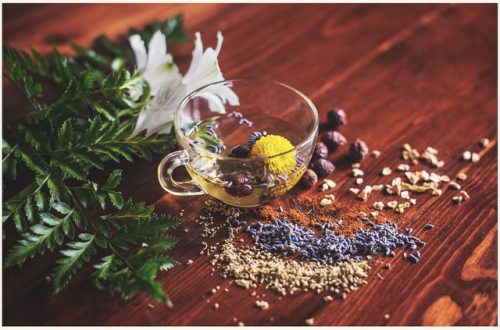Most of us think of dandelions as pretty yellow flowers that grow in our yards (or weeds that we can never really seem to get rid of, depending on how you look at it). So, there’s no surprise that some of us might be skeptical when it comes to dandelion tea.
Is it safe to consume tea made from these weeds? Should you be drinking it? Can you really drink dandelion tea? Let’s take a closer look at the answer and some other information you should know about this tea.
What Is Dandelion Tea?

Dandelion tea is made from the flowers, roots and/or leaves of this plant.
When you purchase commercial dandelion tea, they are generally made either from the roots or leaves — or a combination of the two. Commercial dandelion teas may contain other herbs, so it’s important to read the label for ingredients before purchasing.
When you make homemade dandelion tea, you can use any part of the plant. The leaves tend to be sweeter in flavor, while the root tends to be bolder in taste. The roots should be roasted first, while the leaves and flowers should be dried.
Is Dandelion Tea Safe to Consume?
In general, the answer to this question is “yes.” For the majority of the population, dandelion tea is safe to consume. People have been drinking it since the 17th century when the European settlers brought it to the New World.
Dandelion tea is not only generally safe to consume, but it actually offers a ton of health benefits. (We’ll get to those a little later). There are some situations in which dandelion tea should be avoided.
When Shouldn’t You Drink Dandelion Tea?

Although it’s generally safe to drink dandelion tea, there are some circumstances in which dandelion tea is not safe to consume. If you have dandelions growing in your backyard that have been sprayed with pesticides, you should not, under any circumstances, use it to make dandelion tea.
If you suffer from any medical conditions you take medications for, it’s important to talk to your doctor before beginning dandelion tea. It is possible for it to interact with certain medications. One of the most notable interactions is diuretics. Since one of dandelion tea’s main benefits is that it acts as a diuretic, it shouldn’t be used by anyone who’s already taking a diuretic without the supervision of a doctor. Other medications dandelion tea can potentially interact with include blood-thinners, antacids, diabetes medications, and Ciprofolaxin.
Anyone who suspects that they may have seasonal allergies to dandelion should also avoid drinking this tea.
The effects of dandelion tea are not known in women who are pregnant or breastfeeding, so it’s best to avoid it.
Dandelion Tea Offers Amazing Benefits:
Not only is it generally safe to drink dandelion tea, but it offers some incredible benefits and potential benefits. Some of these include the following:
It’s a great source of vitamins and nutrients.
Dandelion is high in vitamins C, A, K, and E. It also contains potassium, iron, magnesium, zinc, and other nutrients that help support our immune systems and overall health.
It helps decrease water weight.
If you’re feeling a little bloated and want to try to get a flatter belly, dandelion tea could be a good solution. Research has found that drinking two cups of the tea can lead to an increase in urine output.
It might help lower blood pressure.
Thanks to its high potassium content, dandelion can help with electrolyte balance and may reduce blood pressure readings.
It offers anti-inflammatory benefits.
Thanks to tarasterol, a compound dandelion contains, dandelion can help fight against inflammation. This compound can also keep your white blood cells balanced and prevent them from triggering an inflammatory response.
It can help detoxify the liver.
This is one of the most well-known benefits of dandelion tea. Research has found that the polysaccharides in dandelion root help reduce stress on the liver, allowing it to more easily remove harmful toxins and waste.
It might help support kidney function.
It is believed that dandelion root may benefit the kidneys. Its potassium content might help the kidneys filter out toxins better.
It might help aid in weight loss.
A Korean study found that dandelion root might work similarly to the weight loss drug Orlistat, which helps break down fat during the digestive process. Thanks to its diuretic effects, the tea can also help improve metabolic processes, which may become impaired when we are carrying excess water weight in our cells.
It could potentially ward off cancer.
The effects of dandelion root’s ability to protect us against cancer are currently undergoing study. That being said, its strong anti-inflammatory benefits could be key to reducing the risk.
How Much Dandelion Tea Should You Drink?
If you suffer from any medical conditions (especially ones you take medications for), it’s important to talk to your doctor about how much dandelion tea is safe for you to consume. That being said, the majority of people can safely drink dandelion tea on a daily basis. Some people are able to safely drink up to four cups of dandelion tea a day.
When Should You Drink Dandelion Tea?
It’s generally safe to drink dandelion tea at any time of day. Since it is a diuretic, however, it’s a good idea to avoid drinking it during the hours leading up to bedtime. Otherwise, you risk the possibility of disrupted sleep because you’ll have to get up to use the bathroom throughout the night. It’s also best to avoid drinking dandelion tea at the same time as your medications or supplements to reduce the risk of interactions.
Dandelion tea is generally a safe option for most people. If you’re unsure if dandelion tea is a safe option for you, be sure to talk to a licensed medical professional to find out for sure. With its bold, herbal flavor profile, this tea has a lot of benefits to offer. From immune support to improved liver function, there are a number of healthy reasons to start drinking this tea.